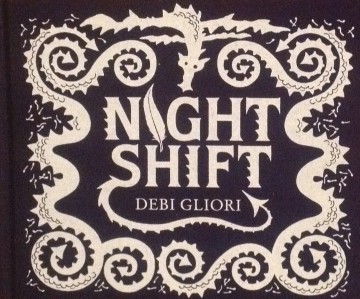Inspiring Older Readers
 posted on 09 Mar 2017
posted on 09 Mar 2017
Night Shift by Debi Gliori
On a recent trip to Waterstones we were grazing the new children’s book when we came across Debi Gliori’s Night Shift. At first sight it looked like an attractive but rather conventional illustrated children’s story from an established children’s author – which is, of course, why the booksellers had located it where they did. However, a few minutes spent reading the content was enough to convince me that this was probably something a lot more unusual – a picture story book aimed at adults. Or, at least, a picture story book with a resolutely adult theme – depression.
Gliori’s text and illustrations amount to an extended prose poem about the nightmare of depression. She tells us that the depression has no clear beginning, that it manifests itself in a lassitude of the body and spirit but that it’s the night terrors that are the most fearsome. She personifies the depression in various ways – as a fog, a lurking sense of dread or an all-consuming sense of being lost. But the dominant metaphor is that of a dragon, or a whole herd of dragons (what is the collective noun for dragons?), big and small that either threaten, nibble or flame-throw their way through the pages.
Just when all seems lost and forlorn, one small thing, the beauty of a birds feather is enough to lift her from the pit and give her a glimpse of the light ahead. It’s a signpost to a world where things are no longer just black and white but subtle and grey.
In a very useful afterword by the author she makes it clear why she feels that a book that confronts a subject as complex as depression needs to be presented in the way she has chosen:
“We speak of the grey fog, the black dog or the downward spiral. When we are in the throes of the severest forms of this illness, many of us are hardly able to speak at all, far less articulate how we feel. This inability to put into words what we’re experiencing is why I have used images to illustrate this bleak territory.”
Night Shift is a category-challenging book and this, I think, is one of its most important qualities. Giving permission for adults to engage with difficult and emotionally draining issues through the medium of a picture book is both innovative and oddly enough a piece of plain common-sense – if this is the best way to confront the topic at hand then there’s no good reason not to use that format.
I think this is an important little book and I just hope you’ll be able to find a copy in your Waterstones. It’s probably wise to start with the children’s section but wouldn’t it be great if they were brave enough to put it in with the other adult reading?
Terry Potter
March 2017